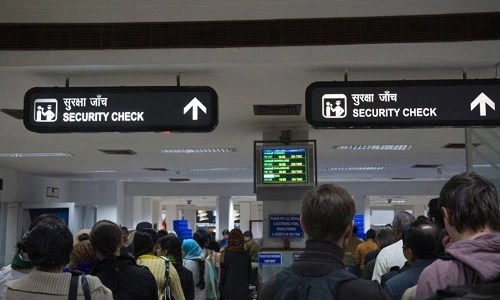
Israel, which has experienced much terrorism, both within its borders and against its citizens around the world, is generally acknowledged to be expert in the field of aviation security. To say that Israel takes such matters seriously, especially at its airports and onboard the planes of its flag carrier, El Al, would be an understatement. So: Can the U.S., with its gargantuan air transportation system, learn anything from Israel when it comes to aviation security? The short answer is “yes,” but with caveats.
For starters, let’s look at how security at the airport level – which is where most flyers first experience it—is handled. Airline passengers leaving out of Israel’s largest airport, Ben Gurion, are advised to check in at least 3 hours prior to their flight’s departure, with Israeli security officers taking full and thorough advantage of that time. It would be exceedingly rare for an El Al passenger to check in 2 hours from his flight and make it aboard, in other words.
Here in the U.S., officials advise air travelers to check-in about 2 hours from their flight, and many travelers chafe even at that. Ticket counter agents at American airports have stories galore about hopeful passengers checking in at 30 minutes, or even 1 hour, before their flight and becoming enraged when told they wouldn’t make it. Imagine being a U.S. flyer and finding out that even 2 hours wouldn’t be enough time to make it onto your plane? This leads us to a key observation about flying today:
Unfortunately, the nature of security is that it still takes time for an airline passenger to be vetted thoroughly enough to allow her to board a commercial airliner. This is true whether in Israel or the United States. Technological advances are surely improving things and will continue to do so (especially in the area of artificial intelligence, or AI), but time is a precious commodity and security eats up some of it. For example:
In Israel, armed uniformed and plainclothes security officers and soldiers stationed outside terminals and at entrances routinely interrogate passengers. Indeed, checks at Ben Gurion often begin more than a mile away from its terminals. And both those officials as well as the ones at terminal entrances have passenger lists which they use to cross-check against lists of people under surveillance. Being subjected to Israeli security officer questioning once you’re at the airport takes time.

At U.S. facilities, airport police typically have the task of patrolling grounds and terminals. While security oriented, their activities are nowhere near as “up close and personal” as those of their Israeli counterparts. The task of closer scrutiny of air travelers is given to the Transportation Security Administration. That agency employs a variety of processes and procedures — mechanical, electronic and biometric as well as human-intuitive — to vet travelers as they make their way through security.
There’s also no let-up for flyers at an airport in Israel once they make it past the security officers stationed outside the airport and at terminal entrances. For instance, their luggage is x-rayed before they even check in for their flight, with anything suspicious put into blast-proof containers and taken to a safe area for close examination. All luggage is x-rayed yet again once it’s been checked in, which also takes time. At U.S. airports, luggage is scanned in a variety of ways once it’s been checked in, and passengers’ carryon bags are looked at as they go through a TSA checkpoint.

In addition, while waiting in an Israeli airport security line you might be questioned by officials, who can even require you to open your email and social media accounts for a look-see. A few years ago, U.S. civil liberties organizations created a firestorm of protest about TSA behavior detection officers and the methods they were using – which were benign in the extreme – to assess airline passengers as they were going through security. Cries of racism and accusations of profiling abounded, and the agency ended up limiting the BDO program to a relatively small number of the nation’s 450 airports.
Though its intricacies are secret, we know that Israeli security also assigns flyers a “risk level,” which is a number ranging from one to six. The lower that number, the less risk you’re believed to carry when it comes to flying on El Al or any other Israeli airline. It goes without saying that a flyer with a risk level of six would come under excruciatingly close examination before being allowed to board an El Al flight.

The U.S. also has a system for alerting TSA security officers that someone coming through their checkpoint should be subjected to additional screening, but it’s generally less obtrusive. Both countries also employ metal detectors at security checkpoints, but the Israeli screening process doesn’t require passengers to remove their shoes or to throw out water, soda and similar liquids. Given that air travelers in Israel have had to run a true security gauntlet to get aboard their flights, it makes sense that having them remove their shoes at that point would be a bit counterproductive.
To be clear, there are more aviation security precautions and measures taken, by both the U.S. and Israel, than are publicly revealed, including in the intelligence realm. But those are behind-the-scenes in nature, and don’t normally add to the time it takes to get through airport security.
What matters for air travelers, however, is the amount of time needed to get aboard a flight once they’ve arrived at the airport. And it’s also true the U.S. may be able to learn some things from the Israelis when it comes to analyzing passengers’ suspicious behaviors and activities.
But the United States is regarded as the land of the free, and Israel — while a vibrant democracy — does have an A to Z security mentality, given the seemingly constant and unending terrorism threat they face. It’s also a very big question whether American air travelers or their civil liberties advocates would even come close to accepting the amount of airport security the Israelis routinely impose on flyers.
Plus, there’s the scope and scale of air travel to consider, and while the Israeli system of aviation security could be scaled up to meet U.S. requirements, the cost of doing so might be extreme. For one, adding many of Israel’s security practices would increase the time – sometimes greatly so, given the often-haphazard ways in which people fly these days — needed to clear security. And while experts say time delays could be avoided by increasing the number of officers needed to impose Israeli security, the cost in added fees to pay for it all might be prohibitive to many travelers.
Consider that approximately 16 million to 17 million passengers annually make their way through Israel’s Ben Gurion Airport, the country’s largest and busiest such facility. Atlanta’s Hartsfield-Jackson International Airport, the world’s busiest, alone saw 108 million passengers in 2018. That’s a lot of flyers, it’s also where Israeli security practices can bump up against U.S. realities.

The Bureau of Transportation Statistics found that for 2018, U.S. airlines or foreign airlines serving the U.S. flew an all-time high of 1 billion passengers. Future passenger counts, both in the U.S. and globally, are only expected to rise as well. So while more far-reaching approaches to U.S. air transportation security can certainly be instituted, they will probably come from advances in AI, biometrics technology, better coordination among security and intelligence agencies, and related practices.
Lastly, publicly available intelligence from a variety of open sources all note that the threat to U.S. air transportation doesn’t seem very high, nor has it been for some time. As attacks against airports and airlines in Belgium, Turkey, Egypt and Somalia in recent years demonstrate, the threat seems to be higher in foreign locations and against “softer” airport and airline targets. For now, in the United States, there doesn’t appear to be much of an appetite among taxpayers and air travelers for Israeli-style transportation security.

